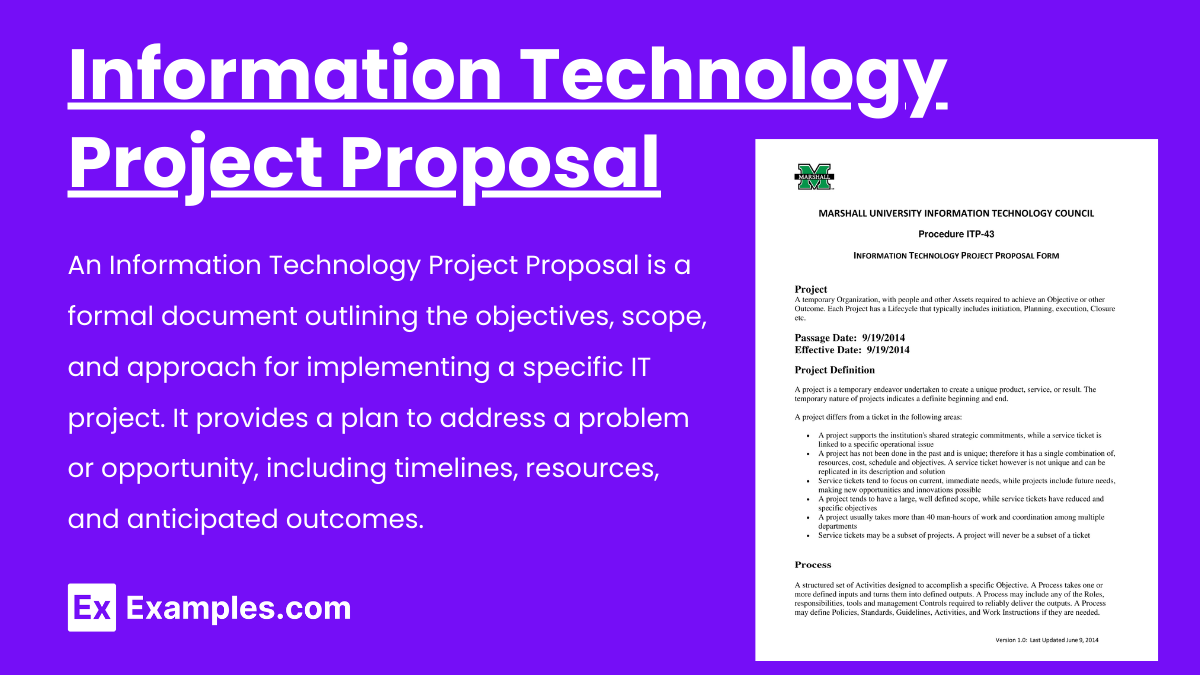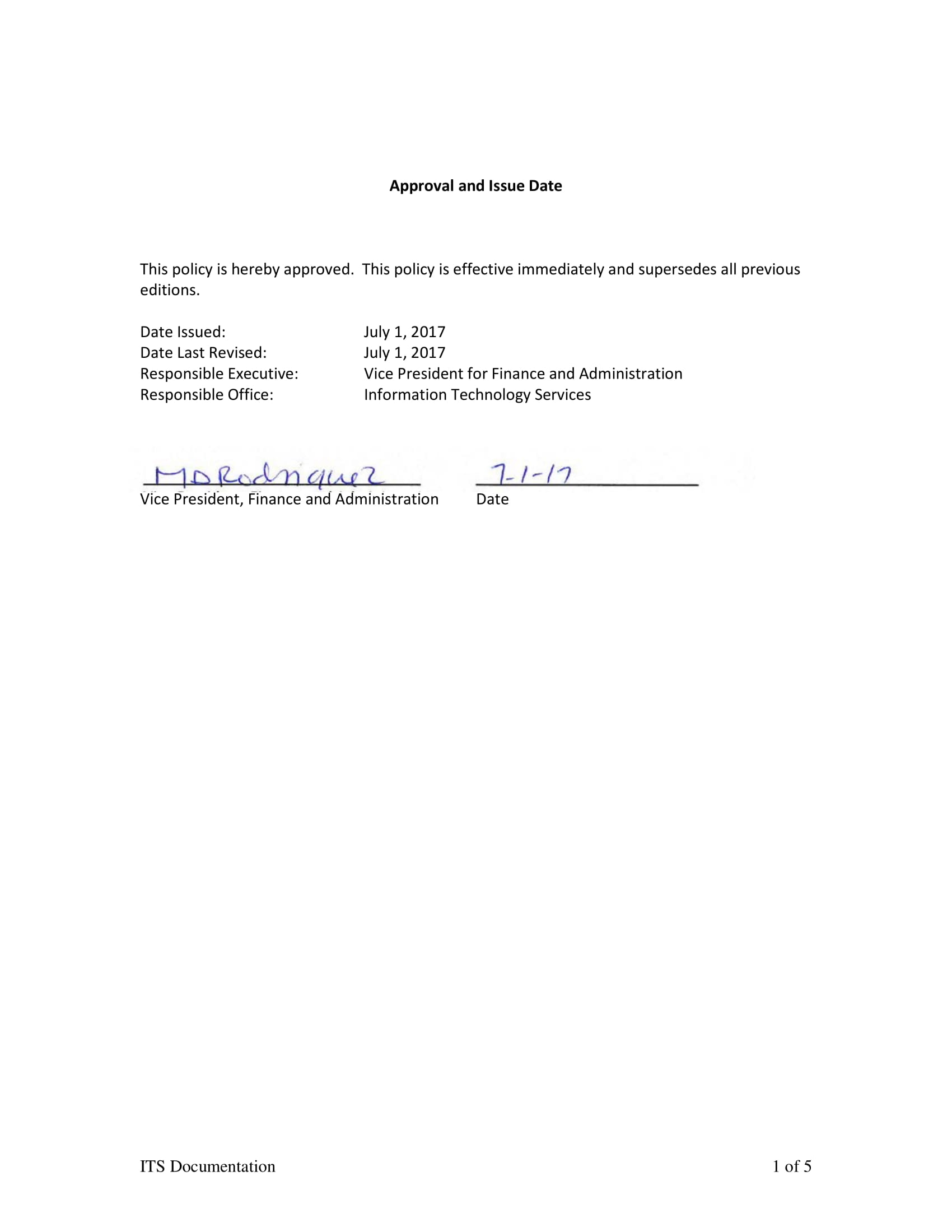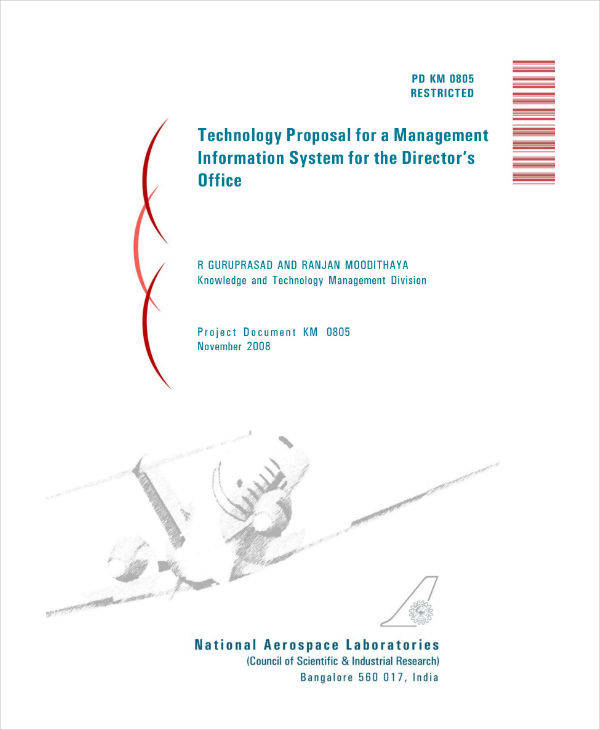10+ Information Technology Project Proposal Examples to Download
In a society run by mobile phones, smart TVs, and other Internet-capable devices, mankind has become dependent on the revolutionary ideas generated by those in the field of information technology.
While we can all agree that these developments have drastically changed our modern world for the better, getting these projects off the ground is a whole other story that has left many programmers, software engineers, and project managers scratching their heads.
What Is an IT Project Proposal?
Projects in the field of information technology cover a vast variety of topics including computer software, electronics, database management, the Internet, and other telecommunications equipment. But because these projects can be risky and costly to develop, the project team is typically tasked to make a proposal for their ideas.
Information technology project proposals are often used in both an academic and business setting. Students taking programs or courses under information technology or its related fields are required to submit their project ideas in the form of a thesis proposal.
Here, panel members, which consist of professors and professionals in the field, are asked to evaluate whether the student’s proposed project is feasible enough to carry through. This allows students to apply what they have learned throughout the program period, and to assess if they are ready to take on the real world. You may also see project proposal outline examples.
IT project proposals are fairly common in the business world as well. Like most businesses these days, your IT business may be looking for more clients to partner with, or has been tasked to complete a series of internal projects. But in order to strike a deal with a client or get a project accepted, a business proposal is most likely needed.
Software Project Proposal Example
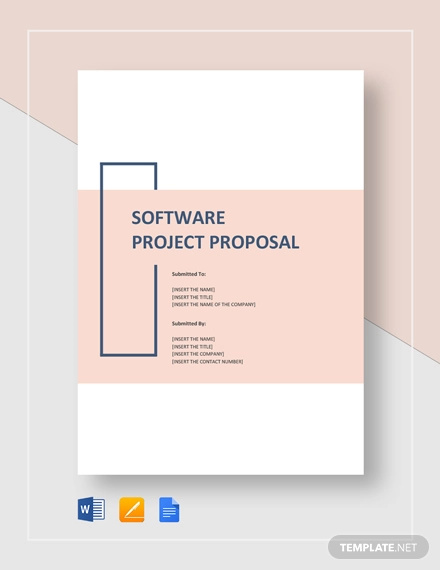
Technology Proposal Template
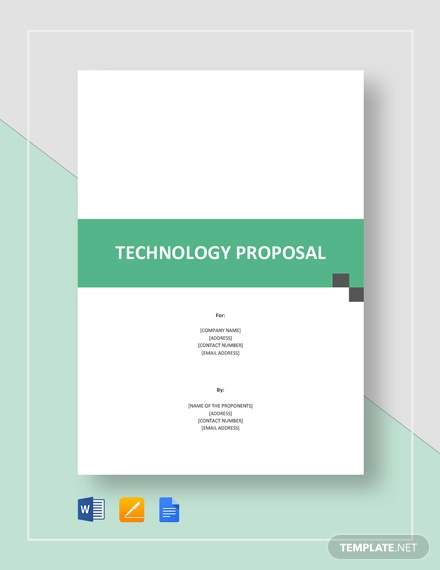
Blank Information Technology Project Proposal Template
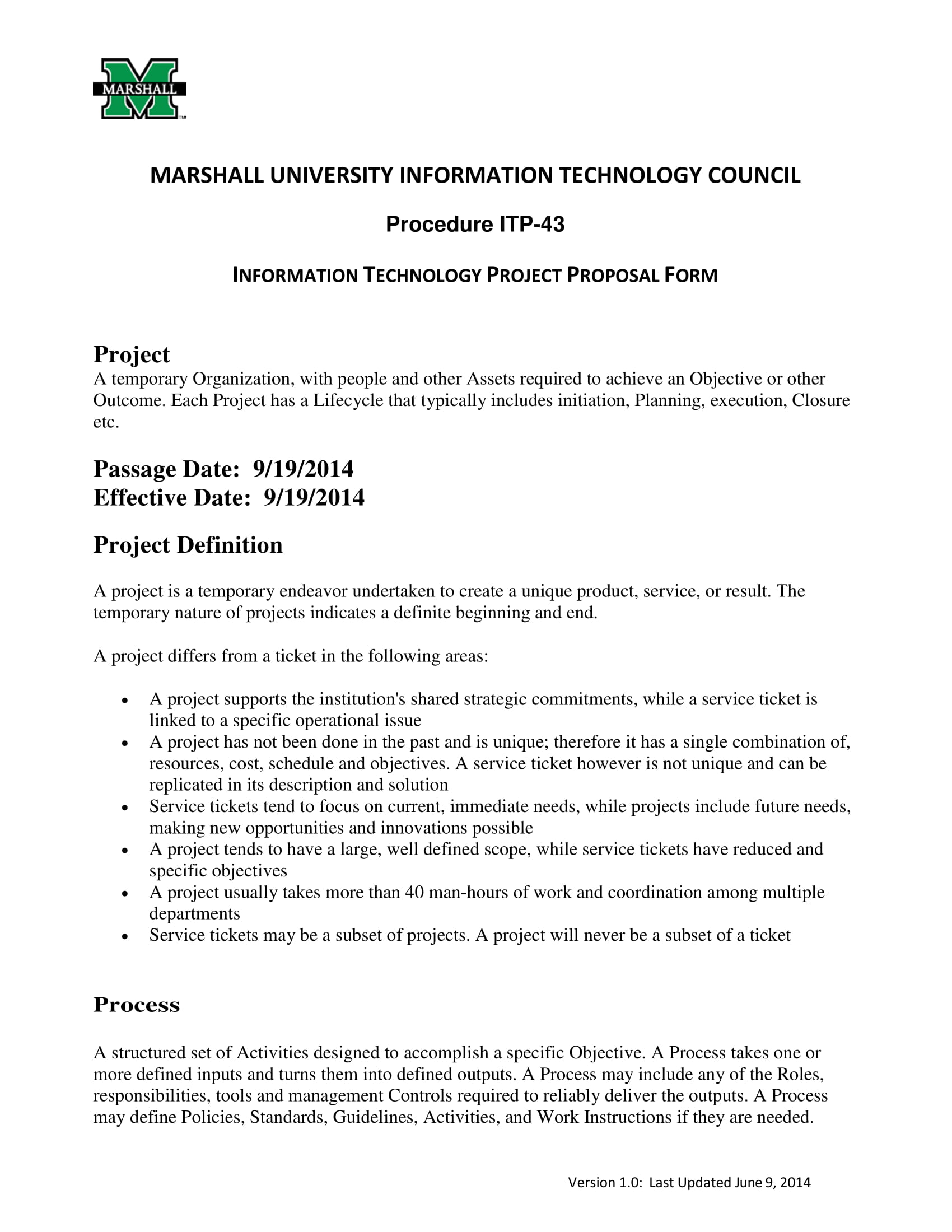 lakeheadu.ca
lakeheadu.caEvery innovative product goes through an intense process of planning, developing, testing, and implementing. But before a project can even make it past the first step, the project team must first make a simple proposal.
Information Technology Project Proposal Form Example
Information Technology Project Proposal Review Example
Management System IT Project Proposal Example
Project proposals are essential in persuading clients or investors to provide the necessary funds for a project to be developed. They exist because investors want to make sure their resources are utilized wisely, and that the project team does not waste any more time and effort on a good-for-nothing idea. For this reason, crafting a well-written project proposal should be of top priority.
Types of Project Proposals
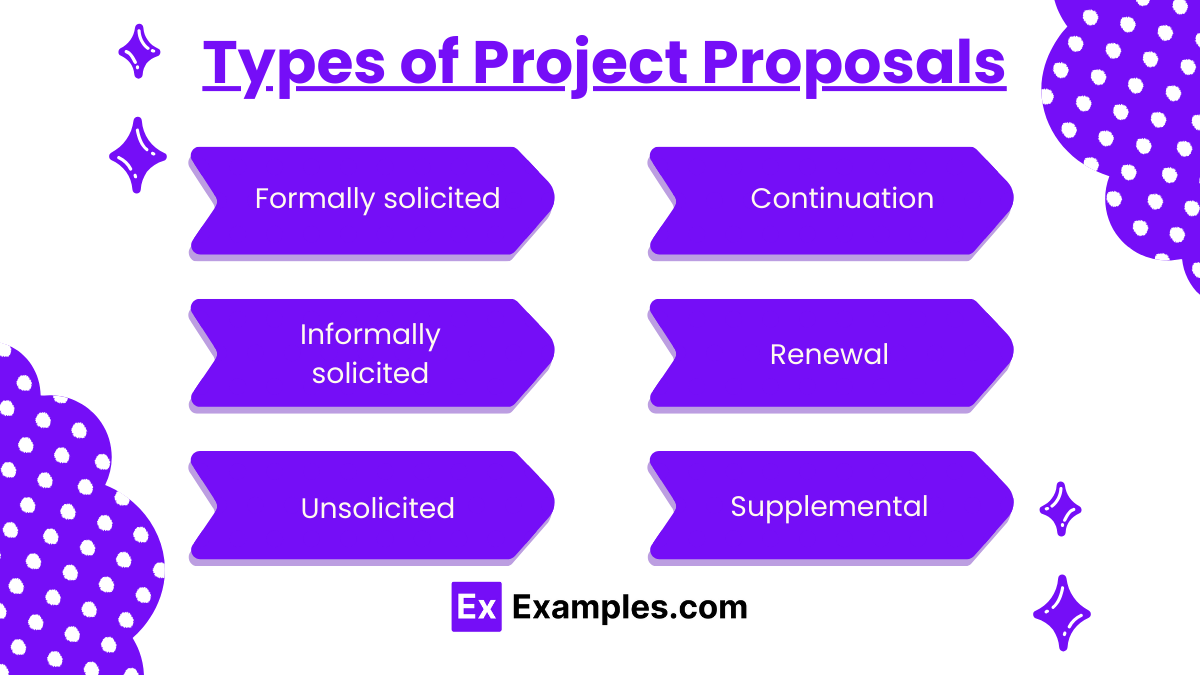
Before you begin planning, you need to know what kind of proposal you’re making. This will help you determine how the proposal should be written, the elements to focus on, and the tone to use.
Listed below are the common types of proposals you’re likely to encounter:
1. Formally solicited
A formally solicited proposal is made in response to an official request for a proposal, also known as a Request for Proposal (RFP). Proponents can refer to the document to know exactly what the client wants, sometimes containing instructions on how the proposal should be prepared. These proposals often require a more structured approach, where proponents must respond directly to whatever has been relayed to them.
2. Informally solicited
Informally solicited project proposals are quite similar to formally solicited ones, except that the information that they are based on isn’t provided in a specific document.
This makes it a lot harder to create as the content of the general proposal could be based on a conversation rather than a set of specified details, goals, deliverables, and potentially even methods. It requires a lot more work to complete, which requires the utmost cooperation of each project team member. You might also be interested in market research proposal examples.
3. Unsolicited
With unsolicited project proposals, though they may not have been asked for, they can still offer a ton of value for the proponents and the prospects alike. They are a lot more persuasive than normal, which is why it is necessary to gather more evidence to prove that the project is worth investing on. You may also see service proposal examples.
4. Continuation
These aren’t exactly your typical kind of proposals. Instead, they are used to remind clients of a project that was previously approved by reporting on its progress, any potential changes, and a permission for the project team to continue as is. Continuation proposals are usually reserved for requesting additional funds as the team enters a new phase in the project’s development. Take a look at student project proposals too.
5. Renewal
Much like a continuation proposal, renewal proposals are made to show an audience why a project is valuable to a given cause, along with why it should be continued. This will help determine whether a project should be terminated or pursued. In this document, the proponents must weigh up the return of benefits with the resources essential to the practice for clients to consider. You may also like research proposal examples.
6. Supplemental
The primary aim of a supplemental project proposal is to be able to justify the extra resources for a project (beyond what was originally proposed), and provide an update on the estimated costs (and sometimes time) for the project to be completed. This could either act as an extension to the original document to widen its scope, or a solution to a certain problem that has affected the project’s development. You can also check out capital project proposals.
Simple Tips for a Successful Project Proposal Defense
After you have written your proposal, you’re faced with the overwhelming task that many proponents fear the most: defending it.
The outcome of a project proposal defense will determine whether the project team can push through with their ideas or not. This may be the foremost step in the process, but it’s also the most critical. That being said, here are five useful tips to help you through this time:
1. Determine expectations.
Most panelists (also known as the review board) set out a criteria of what they expect proponents to present during the defense. These specific expectations serve as your guide to determining what to present and how they should be presented. You may also see
Say for example, your panelists might want you to prepare a slide show presentation that outlines your proposal. They would also want you to present your proposal within a specified time frame, before they begin raising questions and concerns in regards to your project. You might be interested in action research proposals as well.
2. Prepare for panel questions and formulate answers.
The Q&A portion is the most critical part of the defense. This is where any questions or misunderstandings must be settled before the review board can finalize their decision. Questions usually cover the what, why, when, where, and how of the actual project, but it is possible for the panel to go beyond the basics. Some panel members even look for possible loopholes in your professional proposal, especially for areas that weren’t explained properly.
3. Study your RRL.
The review of related literature contains a series of publications that are similar to yours. Here, studies and researches conducted by other authors are used as inspiration to craft your project proposal. You need to consider how you can apply what you have learned from those to the current proposal, and how they may affect the development of your own. You can check out final year project proposals also.
4. Maintain eye contact.
Body language says a lot about what runs through your mind. You need to be confident with your basic proposal, and proper posture and good eye contact is sure to send the right message.
Maintaining eye contact is a great way to keep your audience engaged. It shows that you believe in the proposed project and that you’re confident that the desired goals would be achieved as planned.
5. Make an outline of your project.
When presenting the proposed project, it’s proper etiquette to provide a summary of the entire document in a clear and concise manner. This means that you are not expected to explain the whole proposal, just the statement of what you want to do and how you plan to do it. Make sure to keep your project proposal outline brief and to the point for better comprehension. A timetable in the form of a Gantt chart, as well as an estimated budget to accomplish each deliverable, should be provided as well.
Writing a project proposal is a grueling task that requires careful research and analysis to complete. Because of this, proponents must adhere to the ideal format and language for the type of standard proposal they are making. So if you find yourself in need of a proposal for an information technology project, you can refer to these tips and examples to guide you.


